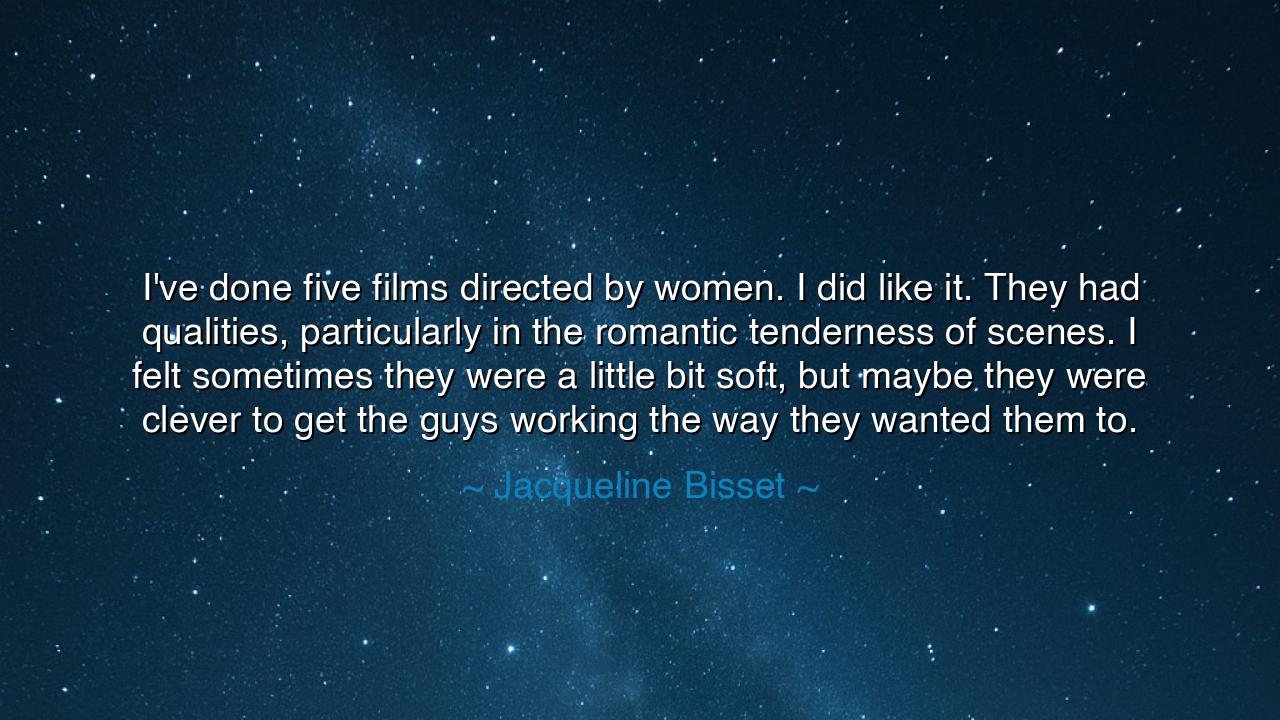
I've done five films directed by women. I did like it. They had
I've done five films directed by women. I did like it. They had qualities, particularly in the romantic tenderness of scenes. I felt sometimes they were a little bit soft, but maybe they were clever to get the guys working the way they wanted them to.






"I've done five films directed by women. I did like it. They had qualities, particularly in the romantic tenderness of scenes. I felt sometimes they were a little bit soft, but maybe they were clever to get the guys working the way they wanted them to." These words spoken by Jacqueline Bisset speak to the intricate and often subtle power of feminine direction in the art of filmmaking. In a world historically dominated by male voices behind the camera, the influence of women directors brings a fresh, tender approach to the stories they tell—particularly in the realm of romance. Bisset’s reflection reveals not just an appreciation for this difference, but a recognition of the strength that lies in softness, in tenderness, and in the subtle power that women bring to their craft. Feminine direction, as she notes, may appear softer in its execution, but it is through this softness that a unique and often deeper connection is forged between actors and the audience, especially in the portrayal of romantic scenes.
In the ancient world, the role of the feminine was often intertwined with the idea of nurturing and tenderness. Consider the great goddesses of mythology—Aphrodite, the goddess of love, whose very existence embodied the delicate, irresistible power of romantic allure. Though her nature could be tender and soft, it was not without strength. Her influence shaped the hearts of gods and mortals alike, demonstrating that tenderness, when wielded wisely, is a force that can command more than brute strength. Similarly, the work of women directors in film, as Bisset observes, brings a nuance to romantic scenes, where tenderness becomes the key to creating a deeper emotional resonance, not just in the actors but in the hearts of the audience.
In the arts of directing, much like the crafting of epic tales, there exists a tension between strength and softness. Take, for instance, the legendary story of Penelope in Homer’s Odyssey. Though she was never depicted as a warrior like her husband Odysseus, Penelope’s strength was in her patience, wisdom, and the tender care she showed in waiting for Odysseus' return. Her feminine qualities were not those of physical battle, but of emotional endurance—her ability to manage the household and keep the hearts of her suitors at bay was a formidable strength. It was not in brute force, but in the soft, nurturing qualities that she held sway over her world. Similarly, in film, the feminine touch in directing often brings out the nuance in characters and scenes, especially in the portrayal of romantic tenderness.
In the history of cinema, women directors have often been the architects of a more intimate, sensitive portrayal of romance. Their ability to highlight the delicate emotions of characters is a gift that resonates deeply in the heart. Ingmar Bergman, one of the most revered directors in film history, often worked alongside his leading actresses—such as Liv Ullmann—to create films that explored the fragility and complexity of human relationships. Though Bergman was a man, his partnerships with women brought an understanding of romantic tenderness that shaped his work profoundly. In a similar vein, the work of female directors in contemporary film often seeks to evoke a tenderness that speaks to the vulnerabilities of love and connection. Bisset’s reflection on how women directors evoke a certain softness in their scenes is an acknowledgment of the unique way in which the feminine approach can elicit genuine emotion from both actors and audiences.
There is also an element of wisdom in Bisset’s comment about women directors being "clever" in getting actors to perform in the way they desire. Cleverness is often associated with a strategic and intuitive understanding of the human heart—qualities that women have long been associated with. In the ancient world, women were often revered not only for their nurturing qualities but for their ability to influence those around them. Think of the legendary Cleopatra, who captivated Julius Caesar and Mark Antony not just with her beauty, but with her wit and charm. Her approach to relationships was strategic, yet deeply personal—she wielded a form of power that was subtle yet profound. This balance of tenderness and cleverness is the hallmark of a great leader, and in the same way, a female director uses tenderness to connect with actors, while intuitively guiding them to their best performance.
From Bisset’s words, we learn that there is profound power in the softer, more intuitive approaches to life, relationships, and art. Tenderness is not a weakness but a profound strength. It is the key to connecting on a deeper level—whether in romantic relationships, in art, or in personal connections. It is often the gentle touch, the quiet word, the unspoken gesture, that creates the most lasting and meaningful impressions. While the world often celebrates aggressive or forceful displays of strength, Bisset’s reflection serves as a reminder that there is power in subtlety, in nurturing, and in connection that transcends the dramatic and the loud.
To the future generations, this lesson is clear: softness does not equal weakness. It is through tenderness, through a gentle touch, that the most meaningful connections are made. Embrace the tender side of your nature, for it holds the power to build lasting romance, to forge deeper relationships, and to guide others with an intuitive understanding of their needs. Just as Bisset finds beauty in the softer approach of female directors, so too should you embrace the quiet, often unseen forces that shape our world. It is in these quiet, thoughtful moments that true strength lies.






AAdministratorAdministrator
Welcome, honored guests. Please leave a comment, we will respond soon